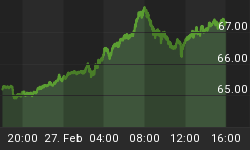Bill Fleckenstein is reporting Empty houses, falling prices, and the end of a boom. For one homebuilder it seems that "Faith Based Financing" has gone to hell. Let's take a look at what Bill Fleckenstein is saying:
You can see how the housing bubble is bursting in places like Columbus, Ohio, where builders and lenders threw common sense away and enticed people to buy homes they couldn't afford.
In June, I suggested that Time magazine's cover story, "Home Sweet Home: Why We're Going Gaga Over Real Estate," might be signaling the peak. It's looking more and more like June was the peak (witness last week's disappointing new-home sales, pre-Katrina), as various problems begin to surface around the country.
Turning to one such place, I am indebted to a reader of my daily column, who forwarded a copy of the Sept. 19 Columbus Dispatch. It ran a thorough article on the plight of a couple in the Galloway Ridge subdivision in suburban Columbus and also shed light on some financing techniques that get folks into trouble. The article, "Suburban Blight," singled out Dominion Homes (DHOM) for enticing people to reach too far. Allow me to share a few quotes:
"Big dreams filled Rick and Christy Alonso when they bought their new house from Dominion Homes. Start a family. Build equity. Move to a larger house. But six months later, their suburban neighborhood on the Far West Side began to deteriorate. New houses suddenly emptied. Thistles and dandelions overran lawns. Neon orange labels appeared in windows, signaling foreclosures."
"Nearly a third of the Franklin County houses and condominiums built since 1998 that have been listed for sheriff's sales involved Dominion buyers." Further, the company is cited for its loan violations: "In 2002 and 2004, HUD randomly selected 42 Dominion loans and found violations in 22 cases, some of which had more than one problem."
Sometimes folks who are on the innocent side wind up getting hammered. (It's not always greed that leads to destruction. Often, just being naive will do it.) Though the Alonsos hadn't planned on spending more than $140,000, a Dominion salesman showed them how they could buy a house for $189,900, of which they financed $187,500. The family was able to shoe-horn into the loan with a creative financial package.
Meanwhile, the Alonsos were given a low estimate for property taxes, and when they got their first payment notice, the tax increase really stung: "'I about croaked,' said Mrs. Alonso." Of course, increasing property taxes hurt their neighbors, too. As of a month ago, 10% of the houses in the Galloway Ridge development, were either in foreclosure or had gone through foreclosure.
The Alonsos now find themselves with a house that cost $189,900 in 2001 and now can't be sold for that price. The real-estate agent has told them that if they really wanted to sell it, they'd have to knock off about $30,000 from the asking price.
"Homebuilders across the country, including Dominion Homes, have found a way around a Federal law barring sellers from giving money directly to buyers for a down payment. They route the money through charities such as the Nehemiah Corp. of America, a faith-based group in California. Nehemiah provides down payments for both existing and new homes, and its relationship with Dominion is the largest of its kind in central Ohio between a builder and charity.
"Nehemiah uses a loophole in federal regulations that allows charities to provide the 3% down payment required to qualify for Federal Housing Administration mortgages. An uncounted number of copycats have followed, leading to an explosion of 'zero-down' loans. Federal authorities do not regulate or track such organizations."
The real question that Fleck does not address is whether or not Dominion Homes purposely overpriced houses then found unwitting buyers by providing minimal down payments. If you jack prices up enough, a "free" down payment is no bargain. To be 100% clear, I am not accusing Dominion of doing that. For all I know Dominion builds the best homes on the market for the prices given. However Dominion (and every other homebuilder for that matter) leaves themselves open to such questions by providing down payment assistance. Is this akin to 30% off sales where prices are raised 30% before the sale? I certainly would like to see an accounting. Losing $30,000 on a house bought in 2001 should raise more than just a few eyebrows.
This is yet another problem with Bush's "Ownership Society". Corruption and greed are rampant, and the very act of trying to get everyone to "own" their home vs. renting has in and of itself jacked up prices to the point that houses are no longer affordable. Affordability of housing in California is 12% or so. This is what happens when laws are passed to favor certain asset classes. It should not be the role of government to persuade people to buy homes whether they really want one or not. Combine stupid government policies with absurdly low 1% interest rates (long gone but the aftermath speculation continues) and you get housing bubbles. We are in one right now but it is breaking.
Let's finish of with a chart of Dominion Homes. Here goes:

Dominion Homes fell from 40 to 15 huh? The market does not seem too impressed with those overly dependent upon faith based financing and neither am I.















